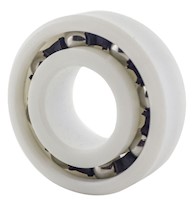Bearing Applications

Bearings are critical components in a wide range of mechanical systems, serving as the interface that supports and reduces friction between moving parts. They enable smooth rotation, linear motion, or a combination of both while minimizing wear and tear. By supporting radial and axial loads, bearings enhance operational efficiency, extend the life of machinery, and reduce maintenance costs. Their versatility makes them an essential element in countless industries worldwide.
From large-scale manufacturing plants to intricate medical devices, bearings play a vital role in facilitating seamless operations. Their applications are diverse, spanning across industries that demand high precision, durability, and efficiency. Below is a detailed exploration of ten industries that extensively use bearings in their operations.
Aerospace
Bearings in the aerospace industry are used in aircraft engines, landing gear assemblies, navigation systems, and control surfaces. They must endure extreme conditions, such as high altitudes, rapid temperature fluctuations, and heavy loads. Specialized bearings like angular contact and spherical roller bearings ensure reliability and precision in critical aerospace applications.
Agriculture
Agricultural equipment like tractors, harvesters, and irrigation systems rely on bearings for efficient performance. They are found in rotating shafts, wheels, and power transmission systems. These bearings are designed to resist dust, dirt, and moisture while ensuring smooth operation in rugged farming environments.
Automotive
The automotive industry utilizes bearings in a variety of applications, including wheel hubs, transmissions, engines, and steering systems. They contribute to vehicle performance by reducing friction, supporting heavy loads, and enabling precise motion. Common types include tapered roller bearings and needle bearings.
Construction
Construction machinery like excavators, cranes, and bulldozers rely heavily on bearings to operate efficiently. Bearings in this industry are designed to handle heavy loads, resist contamination from dirt and debris, and endure harsh environments. Applications include pivot points, drive systems, and hydraulic systems.
Energy
The energy sector, including wind turbines, hydroelectric plants, and power generators, depends on bearings for smooth and efficient operation. Bearings are critical in applications like gearboxes, rotors, and generators, where they must withstand high speeds, extreme temperatures, and heavy axial loads.
Food and Beverage
In the food and beverage industry, bearings are used in processing and packaging machinery, including conveyor systems, mixers, and filling machines. Bearings in this sector are designed to meet hygiene standards, resist corrosion, and operate effectively in wet or sterile conditions.
Marine
The marine industry relies on bearings for ship engines, propeller shafts, and deck machinery. These bearings must endure salty and wet environments, resist corrosion, and support heavy loads under constant motion. Specially coated or sealed bearings are often employed for added durability.
Medical
Medical devices and equipment like MRI machines, dental drills, and robotic surgical instruments require high-precision bearings. These bearings support smooth and precise motion, often in sterile environments. Miniature and ceramic bearings are commonly used for their reliability and low friction.
Mining
Mining equipment such as conveyor belts, crushers, and drilling rigs use bearings to function efficiently under heavy loads and abrasive conditions. Bearings in this industry are designed to resist contamination from dirt and dust while offering durability and reliability in demanding operations.
Textile
Textile machinery, including spinning machines, looms, and dyeing equipment, utilizes bearings to ensure high-speed rotation and precision. These bearings support the continuous operation of machinery and are often equipped with lubrication systems to handle the high temperatures and friction generated during textile production.
Conclusion
Bearings are indispensable components across a broad spectrum of industries, from aerospace to textile manufacturing. They facilitate smooth operation, enhance durability, and improve the efficiency of countless mechanical systems. By understanding the diverse applications of bearings, industries can select the most suitable types to meet their specific needs, ensuring optimal performance and reliability.
Are you looking for Bearings?
Submit an RFQ now!
